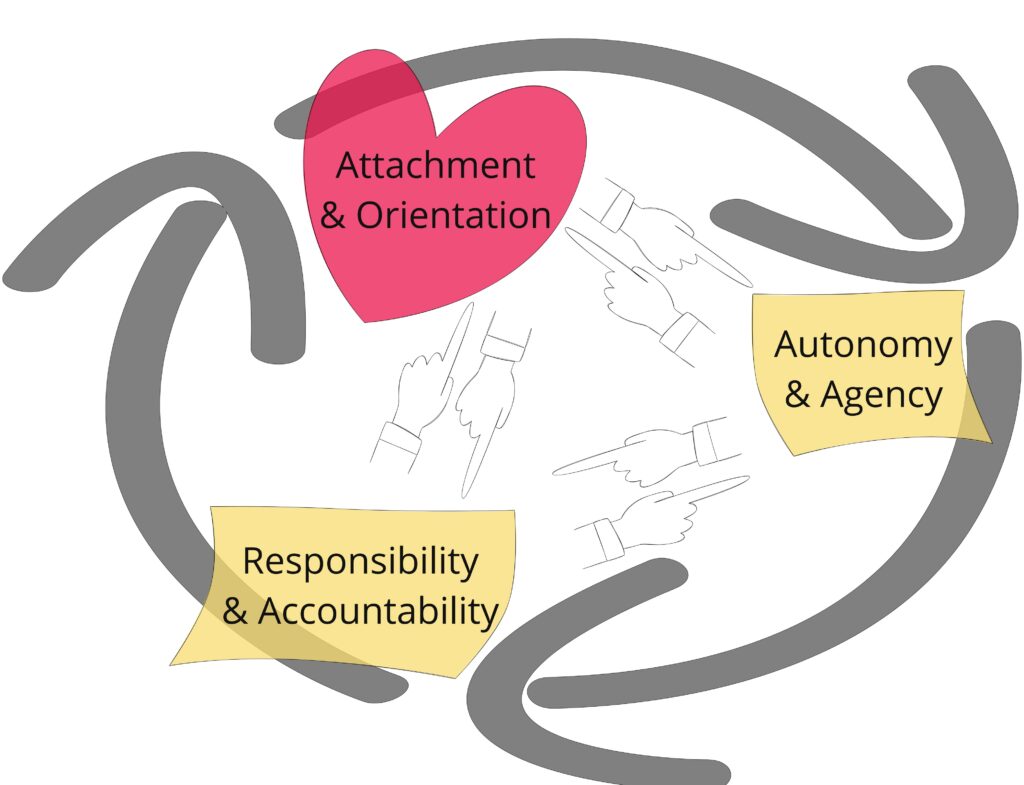Contents of Article
- 0.1 Defining some fundamental features of the embedded, embodied, and relational mind in the ever-emerging Self.
- 1 Attachment & Orientation
- 1.0.1 Attachment
- 1.0.2 Orientation
- 1.0.3 Attachment-Orientation
- 2 Autonomy & Agency
- 3 Responsibility & Accountability
Some consider our experience of the inner self to be a ‘Core Self’, with features of affectivity, agency, continuity, and coherence…
We are, beginning in the first years of our life, filled with an emotional tone of the unfolding experience with which we live that can collectively be called ‘affectivity’. We also have a sense of being the centre of action – of free will, if you will – a body that moves in the world, a self in that body that has agency.
Affectivity and agency can have continuity to them, linking events of experience across time and space. When this continuity has a wholeness and integrity to it, a sense of experience, called ‘coherence’, emerges – a sense that experience is vibrantly held together and there is a matching of our expectations and our sensations.
Dr Dan Siegel
Defining some fundamental features of the embedded, embodied, and relational mind in the ever-emerging Self.
Though we may not be aware of it, often there are nuances behind the words we use that can affect the manner by which they are interpreted – “semantics” we may say. Yet semantics is meaning. And as meaning-making beings we are driven to make sense of what we sense and perceive with continuity; since with continuity comes integrity, with integrity coherence, and with coherence a self-reenforcing sense of Self with ease.
Such ease is an ease manifest from the vital meeting of our innate core needs for connection, protection, autonomy, and belonging with communicative meaning-making from an Other. Indeed, this is a reciprocating affective effect between one’s Self, an Other, and the World that requires a supportive scaffolding throughout the lifetime.
With this in mind, I here seek to articulate a clear knowing of what may already be known. That is, a clarity within the semantics of expressions that are often used when we seek to understand aspects of who we, dynamically and interpersonally, are; drawing on how our relational experiences may have affected our sense of Self as a sensing, perceiving, interpreting, and doing being.
Interestingly these fundamental features are qualities that accentuate the developmental of the Self as differentiated yet connected, with uniqueness and unity. Such qualities include 1) attachment and orientation, 2) autonomy and agency, as well as 3) responsibility and accountability.
Importantly we can view these qualities as cyclical and reciprocal – each enforcing and reenforcing the other whilst also moving through cycles of change.
Qualities that accentuate the development of the Self

Importantly, when we begin to explore these three qualities as fundamental features that may beget an embodied and relational process of integration, we can take consideration that building these into a sense of Self is transitional movement. Such is a scaffolding to understand aspects of who we, dynamically and interpersonally, are. We may, for example, draw on the new understandings provided through the semantic nuances seeking to consider how developmental or relational experiences cultivated these, thus in turn cultivating our sense of Self in relation to Other’s and the World.
Perhaps for you this semantically sound knowing of the known shall support an integrative experience of who you truly are so, a Self scaffolded with affectivity, agency, continuity, and coherence, and thus the emerging capacity to find direction, purpose, and meaning.
Attachment & Orientation
Attachment
Simplistically put, attachment is the inborn mammalian dynamism that primarily maximises safety and protection and at its most basic physiological level increases the chances of infant survival (Siegel, 2020; McElhaney et al., 2009). Throughout development attachment is the pursuit and preservation of proximity (Neufeld & Maté, 2019) that progressively moves from physical proximity (security in infancy) to emotional proximity (intimacy in childhood) and into an embodied felt sense of proximal security and intimacy within the Self (adulthood) (McElhaney et al., 2009).
Significantly, attachment facilitates an interpersonal relationship that serves to instrumentally organise psychological, psychological, and relational processes of communicative meaning making (Siegel, 2020): attachment is the embodied and relational manner in which humans orientate and connect in times of distress and delight (Neufeld & Maté, 2019; Siegel, 2020).
Orientation
Intrinsically interwoven with attachment, orientation is the instinct to seek directional cues of safety or threat whilst finding bearings of authentic authority and warmth (Neufeld & Maté, 2019). Indeed, orientation in its most tangible quality involves an awareness of location within space and time and can be seen as an essential knowing of a physical sense of Self that can only be achieved through a physical sense of the Other (Neufeld & Maté, 2019). Correspondingly, orientation also involves an intangible quality of what is real and true, why or how things happen, as well as what things mean as it relates to the essential knowing of who we are: a psychological bearing to Self that can only be achieved through a psychological bearing to a stronger, wiser Other (Neufeld & Maté, 2019; Siegel 2020).
It cannot be negated here that the most potent experience, and hence why both attachment and orientation are vital in Self development, is to find one’s Self without one’s bearings – physiologically, psychologically, or relationally (Neufeld & Maté, 2019; Siegel 2015). Meaning, without attachment there is no compass point of directionality and thus the emerging adult can experience what may be best described as “orientating voids”; importantly, relational or situational voids “where we find nothing or no one to orient by, are absolutely intolerable to the human brain” (Neufeld & Maté, 2019, p.19).
Attachment-Orientation
These two qualities – attachment and orientation – in themselves, yet alongside the below mentioned characteristics of autonomy-agency and responsibility-accountability, brings forth the value of first and foremost offering a space of meeting the Self with co-regulated connection – spaces in which a ‘stronger, wiser Other’ (caregiver / therapist) – is regulating their own sense of fear or frustration and hearing the fears or frustrations of the Self.
This may involve a blend of intentional attunement alongside curiosity by being “open to what is unfolding, to honour the Self that is emerging through all the many unpredictable stages and experiences this time of Self development entails. Honouring means being present for what is happening and being open and accepting so that we can play an important part in our life” (Siegel, 2015, p. 219).
Importantly this may also involve honouring one’s Self by being open to the challenges whilst acknowledging our internal fears or anticipatory anxieties, frustrations or anger, as well as any sadness or distress (Siegel, 2015), by being receptive and responsive instead of reactive, and to importantly connect rather than to correct our inner most being (Siegel, 2015).
Autonomy & Agency
Autonomy
In its most basic form autonomy is the quality of self-governance that allows us to attain intrinsic or value-based needs and desires physiologically, psychologically, and relationally (Virenque, 2024). Whilst a sense of Self as an autonomous being begins early in development and involves our inherent freedom to choose without external pressures or unwarranted interference, personal autonomy is also an ever-evolving quality that develops interpersonally and affects us intrapersonally throughout the life-span (Siegel, 2015; The Research Centre for Children and Families, 2021).
Meaning, whilst we each hold the fundamental right to self-determination, there are interpersonally and situationally based developmental trajectories that can impede one’s sense of Self as an autonomous being (i.e. the impact of many forms of trauma including systemic, historical, cultural, collective, attachment, acute etc) (Siegel, 2020).
Agency
In contrast to autonomy, agency is the quality of engagement that allows us to intentionally initiate action and to purposefully act in order to exercise influence physiologically, psychologically, and relationally despite situational limitations (Chambon et al., 2014; Markstrom et al., 1997; Hitlin & Elder, 2006). In contrast to the development of autonomy, a sense of Self as an agentic being emerges throughout development and involves our inherent influential potential and our capacity to move internal activity into actions and acts of significance.
Meaning, that whilst agency is oft used synonymously with autonomy, their nuanced interconnection indicates that autonomy is a pre-requisite for agency (Tomczyk, 2024). Where there are interpersonally and situationally based developmental trajectories that impede one’s sense of Self as an autonomous being there may also be a constraint on the implicit sense of Self as the bearer of meaningful cause-effect (Vorhoelter, 2024).
Autonomy-Agency
Importantly, these two qualities – autonomy and agency – are spatiotemporally embedded qualities and processes that are fundamentally intwined with sociocultural mediation (Vorhoelter, 2024). Meaning, both qualities are informed by the past, oriented toward the future, and contextualized within the present (Emirbayer & Mische, 1998). Therefore, without a continuous and contingently balanced attenuation of helplessness or alarmed aloneness, alongside responsive encouragement and respectful dignified limit setting, the capacity to confidently approach and master novel situations whilst also holding the capacity to ask for support when needed becomes thwarted (McElhaney et al., 2009; Siegel, 2020). Such thwarting thus impacting Self-governance and intentional engagement; in turn impacting one’s sense of Self-efficacy and the implicitly embodied belief of empowered significance.
Responsibility & Accountability
Responsibility
Generally speaking, responsibility can be seen as a now-and-next ability to respond with ownership. As an internal modulator responsibility reflects a sense of Self as a value orientated moral and ethical being that is the accountor for one’s activities, actions, and acts (Bergsteiner & Avery, 2003). Responsibility may also be the internal awareness, potentially arrising from a felt sense of autonomy and agency, that opens subjective consideration and recognition of the role one holds within the shaping of experience (Mergler et al., 2007).
With a balanced sense of internal and external locus of control, responsibility may also be seen as the internal and interpersonal process of acknowledgement, agreement, and acceptance of one’s obligations and intentions physiologically, psychologically, and relationally as they pertain to one’s own known capacities (Salusky, et al., 2014; Siegel, 2015).
Accountability
On the other hand, accountability can be seen as a then-and-now ability to account for ownership. As an external modulator accountability reflects a sense of Self as liable to an Other as the acountee for one’s activities, actions, and acts (Bergsteiner & Avery, 2003). Accountability can also be the internal awareness, often of socioculturally driven norms, expectations, and/or pressures, that opens an objective evaluation and answerability for the role one had within the shaping of an experience (Han & Perry, 2020).
With a balanced sense of internal and external locus of control, accountability can be seen as the internal and interpersonal process of observation, evaluation, and attribution of one’s impact physiologically, psychologically, and relationally as they pertain to answerability and consequentiality (Han & Perry, 2020).
Responsibility-Accountability
Importantly, these two qualities – responsibility and accountability – are intrinsically intertwined with virtues of integrity, trust, fairness, humility, honestly, courage, empathy, and emphasises a sense of Self alongside an Other with awareness and responsiveness (Peteet et al., 2022). Such awareness and responsiveness is developed through an ongoing process wherein one is internally or externally motivated to fulfill contextualised roles or tasks that contain ethical/legal or moral obligations and, to a certain extent, a challenge and the extenuation of a capable sense of Self (Salusky, et al., 2014). Importantly, accountability can be seen as the mechanism for which responsibility is enforced and, if cultivated with balance and appropriateness may instil an understanding of the various implications of intention and impact. With this in mind it cannot be negated that both qualities fundamentally rely upon developmentally appropriate capacity whilst paradoxically relying on a pre-emptive platform of inner and interpersonal compassionate belief.
With all this information in mind, remember that often developmental experiences of ambiguous trauma often did not experience attachment and orientation, this then dramatically impacting the opportunities you had for cultivating a balanced or integrated sense of Self with autonomy and agency, or responsibility and accountability. If this is your experience, you may feel a sense of repressive oppression or of burdened responsibility, of helplessness or of hopelessness, and perhaps even now a sense of confusion or loss as to where or how these qualities went amiss. I want to assure you, if this is your experience, that these are qualities that can never, not be cultivated. With therapeutic support, you can work through the ways your developmental experiences of attachment and orientation, agency and autonomy, responsibility and accountability have overarchingly affected your sense of Self.
Together it is possible to make sense of what you sense, perceive, and interpret, to make sense of your learned ways of coping, or your patterns of protection, and to scaffold an understanding with affectivity, agency, continuity, and coherence, and thus cultivate as emerging capacity for direction, purpose, and meaning.
Remember, “by discovering and empowering the true nature of our intraconnected Self, we can widen our lens of identity and transform our experience to live healthier, fuller, freer lives across the entire range of belonging…. Together, MWe can make this integration of self, identity, and belonging our common ground, linking timeless wisdom with timely action in our magnificent intraconnected world” (Siegel, 2023).
 Welcome, my name is Chele, I am a therapist primarily specialising in Trauma – specifically as it presents as Burnout and Breakdown. As a psychotherapist & PACFA & CCAA Clinical Counsellor I work individually with beautiful humans such as yourself who feel alone, lost, confused, & overwhelmed; those of you who are longing for something different.
Welcome, my name is Chele, I am a therapist primarily specialising in Trauma – specifically as it presents as Burnout and Breakdown. As a psychotherapist & PACFA & CCAA Clinical Counsellor I work individually with beautiful humans such as yourself who feel alone, lost, confused, & overwhelmed; those of you who are longing for something different.
As such, I offer my knowledge, skills, and inherent gifts with ears that listen to hear, and a heart open to receive who you are, no matter the suffering you bring; to support you in an exploration of how your past has impacted you and the ways that shows up presently. Together we will rediscover your hope and your sense of Self; we will reconnect you to what matters reclaiming the joy and delight in life you so deserve.
I welcome you to view my services or connect with me to explore how I can assist you in your journey.

